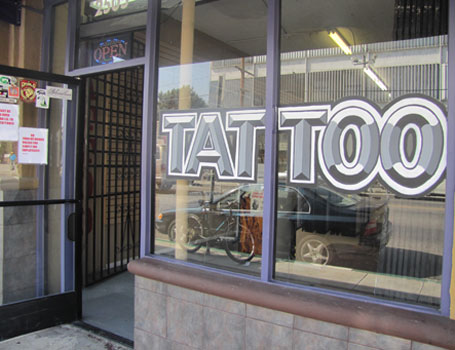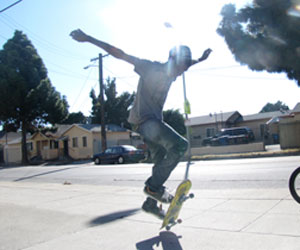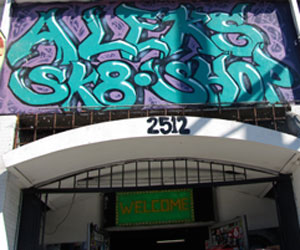Skate Shop Owner Makes 180s in Kids' Lives
Stainless steel racks filled with Huggies and Pampers stand in front of the shop’s open doors. Covered with stickers by Baker, DGK and other popular skateboarding brands, the doors exemplify LA’s skate culture and hint that you are more likely to buy decks, wheels and bearings than diapers at Alek’s.
“There are no skate shops in South Los Angeles. There’s one skate park, but it’s all beat-up,” said Alejandro Rojas, 27, owner of Alek’s SK8 Shop.
Rojas opened Alek’s SK8 shop in 2008. It wasn’t until a year and a half later that Jose, a neighbor with a failing discount store, petitioned Rojas for help.
“I want to make a profit from the discount store items before I turn the store into a completely urban skate shop.”
It might take a while for Rojas to sell the many Hello Kitty backpacks, toiletries and toys left over from the discount store but the shop is still a haven for young skateboarders in the neighborhood.
“We live in a messed-up area,” said Rojas, “if I can help at least one or two kids stay out of trouble, I’ll be happy.”
Rojas is right about his area. The Los Angeles Times reported 277 violent crimes and 478 property crimes in the neighborhood over the last six-months.
The majority of Rojas’ target client-base, 13 to 18-year-old boys, either join gangs or fall victim to violent crimes. However, Rojas is attempting to change this cycle by providing a place for kids to unwind and hangout without getting harassed.
Rojas knows many of his clients have relatives in gangs so he offers an alternative lifestyle by welcoming anyone who comes into his shop in hopes that they will pick up skating instead of a gun.
“You can just chill here,” said Andrew Juarez, 17, “ Alek is like my second dad.”
Juarez is just one of the many boys from the neighborhood who retreat to Rojas’ shop to escape their everyday routine.
“I like coming to Alek’s SK8 Shop because it’s fun,” said Mario Angel, 14, student at Thomas Jefferson High School.
Rojas occasionally plans skating trips to skate parks in Irwindale for the boys to expose them to new ramps, half pipes and other skaters. On days when they go on skating excursions, he prepares the camera he purchased for the boys to film each other and leaves his shop by 8 a.m.
Without the support and services Rojas supplies, many of his clients would not have the opportunity to experience skate culture, which originated in Los Angeles in the seventies.
While Rojas says he loves skate culture because of the freedom and originality achieved while skating, he also recognizes that the culture and popularity of skateboarding has changed over the years.
“When we used to skate, it wasn’t that big, there were no skate parks,” said Rojas.
Now, kids flock to skate parks built especially for skaters by pro-skaters like Rob Dydrek and Alec Beck, to perfect their tricks and watch others do the same.
“Skate parks are safe spots because kids won’t get harassed. Kids have more skills than when I was skating because they have more things to skate on,” said Rojas.
Despite the generational divide between Rojas and the young boys that frequent his shop, Rojas’ drive to open his store everyday stems from the fact that he’s positively influencing each one of his clients by providing them with a place to partake in LA’s skate culture.
“As long as I know I changed a couple of kids lives, I will feel good about what I’m doing.”



